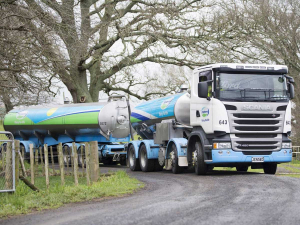Fonterra Suppliers Confident in Mainland Dairy Future
Fonterra's 460 milk suppliers in Australia, who will switch to Lactalis end of this month, are unfazed with the impending change.
 Waikato-based investor Charles Whiting says he supports Fonterra's proposed capital structure because the status quo isn't working in a declining milk volume environment.
Waikato-based investor Charles Whiting says he supports Fonterra's proposed capital structure because the status quo isn't working in a declining milk volume environment.
OPINION: Making a change to any businesses is difficult. Augmenting a capital structure with the diversity of stakeholders and complexity as at Fonterra is a significant challenge.
That said, change is needed and the proposal on foot is sensible and coupled with a refreshed executable strategy.
Fonterra has been plagued in the last decade with what I call an 'ambition-to-ability' mismatch. In short, Fonterra didn't have the necessary skills to take on the world.
Execution was lacking. Poor choices were made around strategy: a lack of quality thinking and diligence characterised investments. Governors failed in not asking the right questions, or knowing what to ask, and effectively let management run roughshod over a national champion. Some farmers rightly left to pursue other opportunities.
It is often forgotten what would happen if Fonterra didn't exist in its co-operative format. It is very simple. Farmers would be squeezed down to accept lower milk prices just above their breakeven. Money wouldn't end up back in local communities and tax and GST takes would immediately impact government. This on-farm economic multiplier effect delivered by an efficient cooperative is critical to New Zealand. Regardless, New Zealand farmers are resilient and continue to deliver quality nutrition to the world.
The core of this need for quality nutrition underpins the new Fonterra strategy. It plays to Fonterra's strengths, taking account of likely New Zealand production declines (mostly from regulatory pressures), the benefits of New Zealand pasture-based milk (both environmental and nutritionally) and Fonterra's world leading research and development capabilities.
Regardless of the new strategy there is one thing that Fonterra needs to deliver - performance. You can have any capital structure, however, if a business doesn't perform it will fail. Behind performance are three clear requirements: a clear articulated strategy, capable people and measured execution against the plan. It is clear to me that elements of this are coming together. Execution must be held to account by the board and, failing that, by shareholders playing a more active role. We cannot afford more thought experiments using shareholders' capital.
Credit needs to be made for work done already. The level of communication and transparency from the board and management has increased ten-fold. The humility of the current management team and board to own up to mistakes of the business - many of which didn't happen on their watch - has been excellent. Coupled with a sensible and achievable strategy they will position Fonterra for a strong future.
Why will I be supporting the proposed capital structure? Put simply, the status quo doesn't work for a declining milk volume environment.
Personally, I would have gone further and brought back the units and also a number of the 'dry shares'. Either way the option remains. Farmers need to think about their shares as a 'right to supply' because if the strategy is delivered, you will be financially better off to supply Fonterra.
This new capital structure, with an executable strategy, give us confidence to invest on farm and let Fonterra do for future generations what it has for past - deliver prosperity and wealth to rural communities and in turn contribute significantly to New Zealand's global understanding. Dairy is enduring: it can deliver perpetual value, unlike extractive resources. Government and regulators cannot afford to forget this. As a smart man once said, "you can't put iron ore on your Weetbix".
Charles Whiting is a Waikato-based former finance executive investing in dairy and other NZ businesses.
Budou are being picked now in Bridge Pā, the most intense and exciting time of the year for the Greencollar team – and the harvest of the finest eating grapes is weeks earlier than expected.
The Real Estate Institute of New Zealand (REINZ) has released its latest rural property report, providing a detailed view of New Zealand’s rural real estate market for the 12 months ending December 2025.
Rural retailer Farmlands has released it's latest round of half-year results, labeling it as evidence that its five-year strategy is delivering on financial performance and better value for members.
OPINION: "We are back to where we were a year ago," according to a leading banking analyst in the UK, referring to US president Donald Trump's latest imposition of a global 10% tariff on all exports into the US.
DairyNZ says the Government’s proposed Resource Management Act reform needs further work to ensure it delivers on its intent.
Overseas Trade Minister Todd McClay says he's working constructively with the Labour Party in the hope they will endorse the free trade agreement (FTA) with India when the agreement comes before Parliament for ratification.
OPINION: Expect the Indian free trade deal to feature strongly in the election campaign.
OPINION: One of the world's largest ice cream makers, Nestlé, is going cold on the viability of making the dessert.